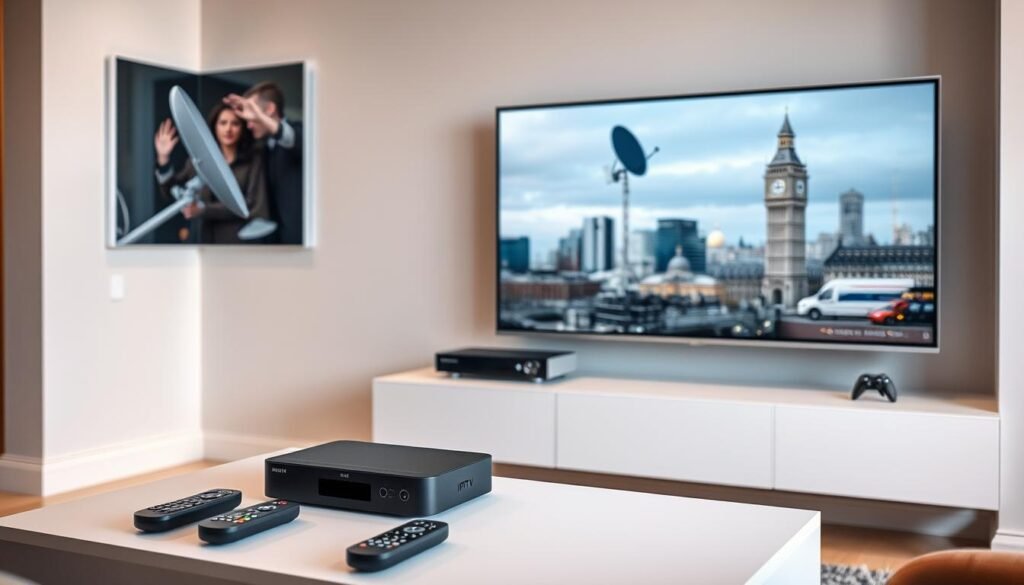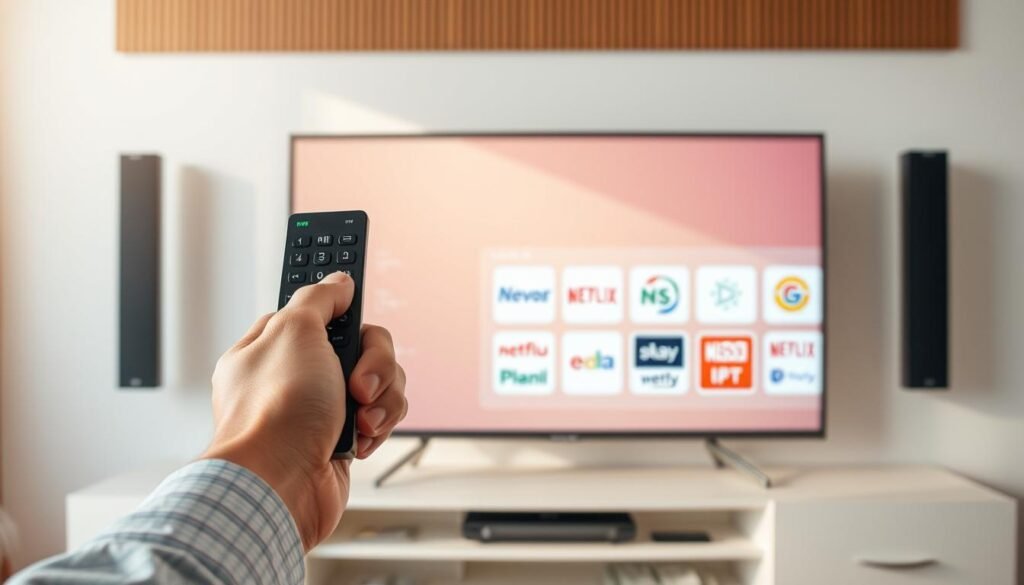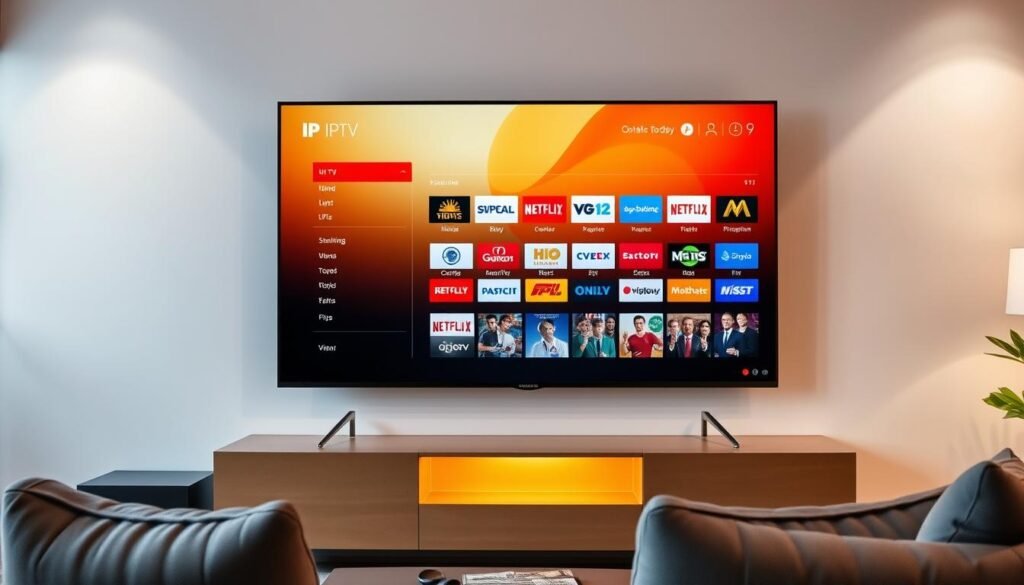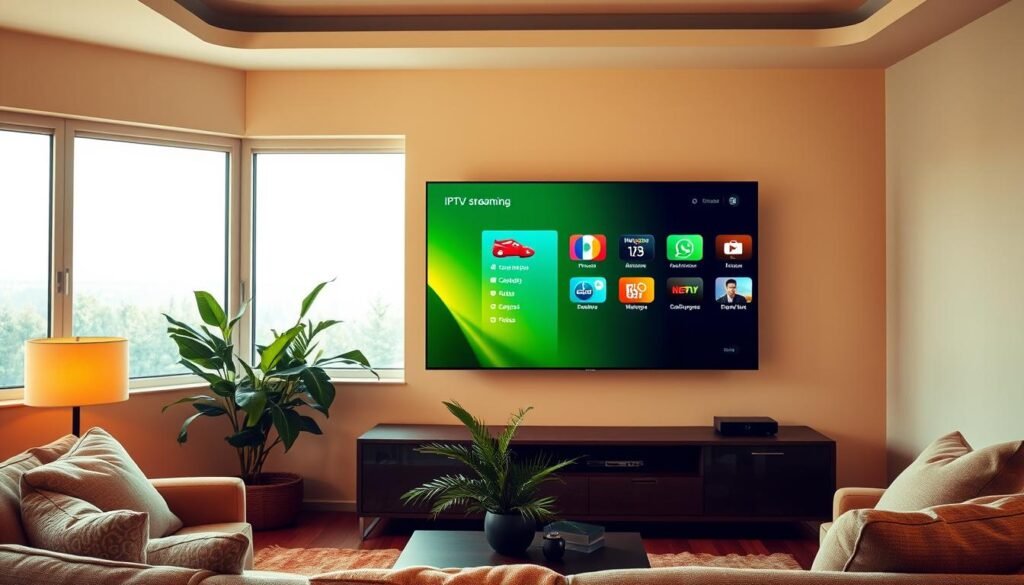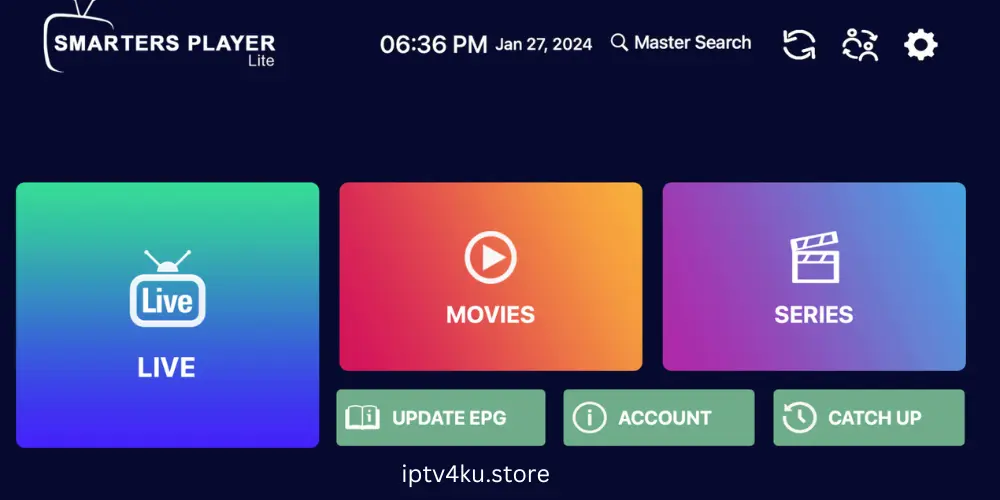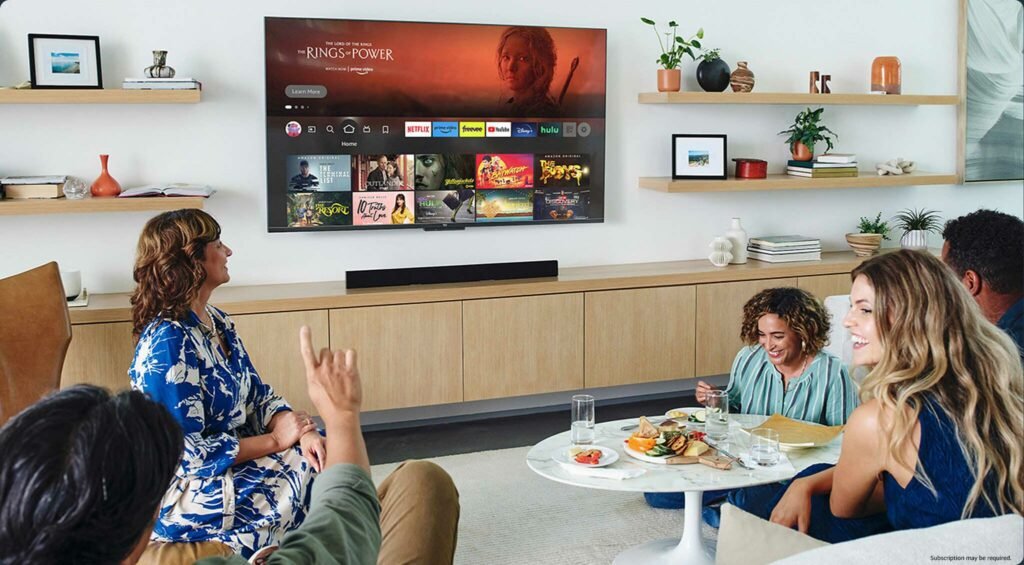When looking at TV services in the UK, I face a big choice: IPTV or traditional Cable TV. There are many providers with different services. It’s key to know the differences between these two.
The fight between IPTV and Cable TV is big in the UK. People want the best TV service uk. IPTV is modern and internet-based. Cable TV uses a traditional setup.
Looking closer, each has its good and bad points. In this article, I’ll compare IPTV and Cable TV. This will help you choose wisely.
Key Takeaways
- IPTV offers flexibility and a wide range of channels.
- Cable TV gives a traditional viewing experience.
- For IPTV, good internet is essential.
- Cable TV doesn’t need fast internet.
- Costs and package choices differ between IPTV and Cable TV.
The Current Television Landscape in the UK
The UK’s TV scene is changing fast with new tech. Now, people have many uk television options to pick from. This makes choosing a TV service more complicated than before.
Evolution of TV Services in Britain
TV services in the UK have changed a lot. They’ve moved from old analogue to new digital like IPTV and cable TV. This change is thanks to tech progress and what people want to watch.
Market Share of Different TV Technologies
In the UK, different TV techs have their own share of the market. digital tv providers uk offer a variety of services. IPTV, cable, and satellite TV each have a big part of the market, meeting different viewer needs.

Choosing between these techs depends on what you want to watch, how much you’re willing to pay, and how good the service is.
TV Licensing Considerations
It doesn’t matter what TV tech you use, you must follow TV licensing rules in the UK. The TV licence fee helps fund public TV. It’s key for viewers to know their TV licence duties.
- Everyone watching live TV needs a TV licence.
- The licence fee pays for BBC services.
- Some groups, like those over 75, might not need a licence.
Knowing these rules is important when picking your TV service.
What is IPTV? Understanding the Technology
To make informed decisions about TV services, it’s key to know what IPTV is and how it operates. IPTV, or Internet Protocol Television, sends TV content over the internet. This is different from traditional cable or satellite TV.
How IPTV Works
IPTV sends TV content straight to your device over the internet. This happens through a fast internet connection. It offers a more personal viewing experience. Unlike old TV, IPTV uses the internet to deliver content. This lets users watch a wide range of channels and on-demand shows.
Types of IPTV Services Available in the UK
In the UK, there are many IPTV services to choose from. They cater to different tastes. These include:
- Live TV streaming
- On-demand content libraries
- Time-shifted TV services
Popular UK IPTV Providers
Some top IPTV providers in the UK are:IPTV4KU.STORE
BT TV
BT TV offers a full IPTV service. It combines live TV with on-demand content. It’s known for its good prices and works well with broadband.
NOW TV
NOW TV, owned by Sky, provides flexible IPTV services. It doesn’t need a long-term contract. It’s famous for its sports and entertainment.
TalkTalk TV
TalkTalk TV has various IPTV packages. These include live TV and on-demand content. It’s known for its easy-to-use interface and good prices.
Here’s a comparison of the IPTV services offered by these providers:
| Provider | Contract Flexibility | On-Demand Content | Live TV Channels |
|---|---|---|---|
| BT TV | 18-month contract | Extensive library | Over 60 channels |
| NOW TV | No contract | Varied on-demand content | Live sports and entertainment |
| TalkTalk TV | 18-month contract | Good selection | Over 50 channels |

Cable TV in the UK: The Traditional Option
In the UK, cable TV is a well-known choice for TV viewing. It has been a favourite in many homes for years.
How Cable TV Infrastructure Works
Cable TV uses fibre-optic and coaxial cables to bring TV channels to homes. This setup lets many channels and services reach viewers easily.
Providers like Virgin Media keep these networks strong. They update them often to boost quality and speed.
Major Cable TV Providers in the UK
In the UK, a few big names lead the cable TV market. Virgin Media is one of the biggest. It offers lots of TV channels, broadband, and phone services.
Virgin Media
Virgin Media is famous for fast broadband and lots of TV channels. It’s a top pick for those wanting a bundle service.
Sky Q
Sky Q is mainly a satellite TV service. But, it also offers cable TV in some places. It gives a top-notch viewing experience with features like 4K and HDR.
Coverage Areas and Availability
Cable TV is available in many parts of the UK. But, where you can get it depends on the provider. Virgin Media covers a lot of the country, but some areas might not have it.
Before picking a cable TV service, check if it’s available in your area. You can do this on the provider’s website or by calling their customer service.
UK IPTV and Cable TV: What is the Best?
Choosing between IPTV and Cable TV requires looking at their main features and benefits. Each service has its own strengths, making it important for UK viewers to understand these differences.
Direct Comparison of Core Features
IPTV sends content over the internet, offering a flexible viewing experience. Cable TV, on the other hand, uses a traditional cable system for a stable connection. A recent survey found that “IPTV is gaining popularity for its flexibility and on-demand content.”
Source: UK IPTV Telecoms Industry Review
UK IPTV uses broadband, while Cable TV needs a dedicated cable connection.
UK IPTV’s core features include:
- Personalised viewing experiences
- On-demand content
- Multi-device support
Cable TV’s core features include:
- Reliable connection
- High-quality broadcast
- No requirement for broadband
Price Points and Value Proposition
Pricing is a big factor in choosing IPTV or Cable TV. IPTV starts at £15-£25 per month. Cable TV costs more, from £20-£50 or more, depending on the provider and package. “IPTV’s cost-effectiveness is a major draw for budget-conscious consumers,” an industry report noted.
Content Libraries and Channel Selection
Both IPTV and Cable TV have a wide range of channels and content. IPTV often has more on-demand content and catch-up TV. Cable TV has a broad channel selection but less on-demand flexibility. For example, some IPTV providers offer exclusive sports packages not found on Cable TV.
Flexibility and Contract Terms
UK IPTV is more flexible, with month-to-month or no-contract options. This makes it easier to change plans or cancel. Cable TV providers usually require longer contracts, which can be a drawback for some.
In conclusion, the choice between UK IPTV and Cable TV depends on what you value most: flexibility, pricing, or content. By looking at these key areas, viewers can make a choice that fits their viewing habits.
Cost Analysis: Subscription Fees and Equipment
Choosing between UK IPTV and cable TV in the UK requires a detailed cost analysis. We need to look at monthly fees, initial setup costs, any hidden charges, and bundle deals. These deals often include broadband and phone services.
Initial Setup Costs
The setup costs for UK IPTV and cable TV vary. Cable TV usually means a technician visit, which costs extra. IPTV, however, might only need a good internet connection and a compatible device, saving you money upfront.
Monthly Subscription Comparisons
UK IPTV offers flexible pricing plans, allowing you to pick your channels. Cable TV providers have tiered pricing but less flexibility. For example, cable TV providers in the UK like Virgin Media offer bundles that include TV, broadband, and phone.
Hidden Fees and Contract Terms
It’s important to check the contract terms for both IPTV and cable TV. Some providers charge extra for equipment rental, installation, or data cap breaches. Knowing these extra costs helps you choose the best TV service in the UK for you.
Bundle Options with Broadband and Phone
Many UK TV providers offer bundles with TV, broadband, and phone. These bundles can save you money compared to separate subscriptions. For example, combining IPTV or cable TV with broadband is often cheaper, especially for a full telecommunications package.
In summary, when comparing UK IPTV and cable TV costs, consider all expenses. This includes initial setup, monthly fees, and any hidden charges. By doing this, UK viewers can make a better choice that fits their viewing needs and budget.
Content and Programming: What Can You Watch?
UK IPTV and Cable TV in the UK offer a wide range of shows. But what can you watch on each? It’s all about the exclusive shows, sports, international channels, and on-demand libraries.
Exclusive Content Comparison
UK IPTV and Cable TV differ in what they offer. IPTV gives you access to online content like catch-up TV and original series. Some IPTV providers even have exclusive sports packages and premium channels.
Cable TV, on the other hand, has its own exclusive content. This includes sports and premium movie channels. For example, major Cable TV providers in the UK show big sports events, attracting sports fans.
Sports Coverage Differences
Sports coverage is key for many viewers. Cable TV has long been a leader, with Virgin Media offering extensive sports packages. UK IPTV services are catching up, offering competitive sports packages and exclusive channels.
International and Niche Channel Availability
IPTV services often win when it comes to international and niche content. They can offer more international channels and niche programming thanks to their streaming tech. This is great for expats or those looking for unique content not on mainstream Cable TV.
On-Demand Libraries
On-demand libraries are crucial in today’s TV world. Both IPTV and Cable TV offer on-demand content. But IPTV services often have better on-demand options, letting viewers watch whenever they want. Cable TV providers also have on-demand services, but they might be limited by their traditional setup.
In summary, both IPTV and Cable TV have their own strengths in content and programming. Your choice will depend on what you prefer, from exclusive shows to sports, international channels, and on-demand viewing.
Installation and Setup Process
Setting up your TV service can be easy, but knowing what to expect is key. IPTV and Cable TV have different installation processes.
Cable TV Installation Requirements
Cable TV needs a physical link to the cable network. A technician will come to your home to set up the cabling and gear. This might mean drilling holes for cables.
UK IPTV Setup and Equipment
UK IPTV uses your internet connection. It’s easier to set up, often by yourself. You’ll need a compatible device or an IPTV box and a fast internet connection.
Self-Installation vs. Professional Installation
IPTV can be set up by yourself, but some might want professional help. Cable TV usually needs a pro to install it because of the physical setup. Here’s what differs:
- IPTV: Easier, can be done by yourself, uses the internet.
- Cable TV: Needs physical cables, usually requires a pro to install.
When picking between IPTV and Cable TV, think about the setup. Do you want to do it yourself or need a technician? This choice depends on the digital tv providers uk and streaming services uk you’re looking at.
Technical Considerations: Reliability and Quality
Choosing between IPTV and cable TV means looking at their technical aspects. These aspects affect how well they work.
Streaming Quality and Resolution
Streaming quality is key for a good viewing experience. IPTV can offer up to 4K resolution, depending on your internet. Cable TV usually has a steady quality but might not always be 4K without extra gear.
Bandwidth Requirements for IPTV
IPTV needs a fast and stable internet connection. For SD content, 3 Mbps is the minimum. HD content needs 15 Mbps, and 4K content requires 25 Mbps or more.
Service Interruptions and Weather Impacts
Cable TV is less likely to have service issues than IPTV. IPTV can be affected by internet problems or outages. Weather can also affect satellite TV more than cable or IPTV.
4K and HDR Availability
Both IPTV and some cable TV offer 4K and HDR content. This makes watching shows better. IPTV streams 4K content online, while cable TV might need special equipment for 4K.
| Feature | IPTV | Cable TV |
|---|---|---|
| Streaming Quality | Variable, up to 4K | Consistent, up to 4K with hardware |
| Bandwidth Requirement | Dependent on content quality | Not applicable |
| Service Interruptions | Prone to internet outages | Less susceptible |
| 4K/HDR Availability | Supported by many providers | Supported with specific equipment |
Customer Service and Support Comparison
The quality of customer service and support from TV providers is key to a good viewing experience. When looking at IPTV and Cable TV services in the UK, think about the support each offers.
Technical Support Options
IPTV and Cable TV providers have different ways to help you. IPTV often uses online chat, email, and phone, with some available 24/7. Cable TV also offers phone, email, and online chat, and some have stores for face-to-face help.
Customer Satisfaction Ratings
Customer satisfaction ratings show how good a service is. Some IPTV providers get high ratings for their flexible and tailored services. Cable TV ratings vary, depending on where they operate and the quality of their setup.
Complaint Resolution Processes
How quickly a provider fixes problems is important for a smooth viewing experience. IPTV usually solves issues fast through their online support. Cable TV might take longer because of their complex setup and need for physical help.
| Provider Type | Technical Support Options | Customer Satisfaction Rating | Complaint Resolution Efficiency |
|---|---|---|---|
| IPTV | Online chat, email, phone (often 24/7) | Generally higher due to personalized service | Quick resolution through online systems |
| Cable TV | Phone, email, online chat, in-person | Varies by provider and region | Can be slower due to infrastructure complexities |
When picking between IPTV and Cable TV, think about the customer service and support. This will help you choose what’s best for your viewing needs.
Conclusion: Making the Right Choice for Your Household
Choosing between UK IPTV and Cable TV depends on several factors. These include your viewing habits, budget, and personal preferences. Both services have their strengths and weaknesses.
When deciding on the best TV service in the UK, consider a few things. Look at the content offerings, pricing, and technical requirements. IPTV services offer flexibility and a wide range of channels. Cable TV provides a traditional viewing experience with many channels.
To make an informed decision, assess your needs and compare the uk television options. Think about streaming quality, bandwidth requirements, and customer support. By considering these, you can choose the best tv service uk for your household.
Ultimately, the choice between IPTV and Cable TV depends on your individual circumstances. Understanding the key differences helps you make a decision that fits your viewing habits and budget.
